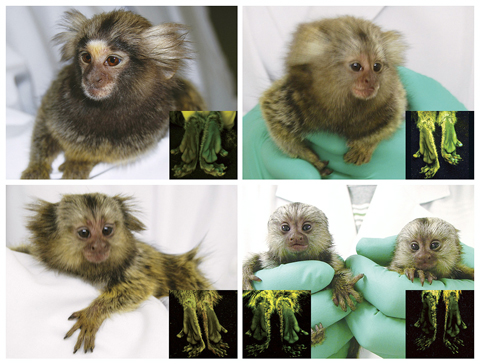They sound more like a Victorian freak show than science, but researchers say that glow-in-the dark monkeys created in a Japanese lab could be a breakthrough in treating human inherited diseases.
The monkeys were given a gene from a jellyfish and, significantly, it was inherited by their young — the first time a genetically modified animal has passed such genes down a generation. Researchers said it was major step towards understanding Parkinson’s and motor neurone disease.
Animal rights groups fear it could mean more primates are used in research labs. It also raises the possibility of genetically modifying humans, although such work is illegal in Britain and in most countries.

PHOTO: REUTERS
Erika Sasaki and her team at the Central Institute for Experimental Animals in Kawasaki, Japan, added a gene to marmoset embryos that made them glow green under ultraviolet light. The embryos were transferred into surrogate females, and produced five live births.
All carried the green gene somewhere in their bodies, and two passed it to offspring. Last month, a male was born using sperm from one monkey called Kou, and two more glowing marmosets have been born since. One died after being bitten by its mother. All are healthy, and do not glow under normal lighting.
The scientists plan to create families of monkeys that develop neuro-degenerative diseases.
“Our method promises to be a powerful tool for studying the mechanisms of human diseases and developing new therapies,” they wrote in the journal Nature.
But an accompanying editorial warns it “promises to raise the stakes” over animal rights by “intentionally introducing a harmful gene into the primate gene pool.”
Genetically modified mice are often used to learn about human diseases, but in some cases primates will be more informative.
“This is potentially very exciting,” said Kieran Breen of the Parkinson’s Disease Society. “Because primates are much closer to humans than mice, we’ll have a new animal model to work with.”
Aside from whether the technique can indeed recreate human-type diseases, a European directive may prohibit use of primates in such research. Vicky Robinson, of NC3Rs, which campaigns to reduce use of animals, said: “We can’t assume a transgenic marmoset will be better for disease research than, for example, a transgenic mouse. Any researcher will need to show the added scientific value of using a monkey outweighs the significant ethical considerations accompanying its use.”

Indonesia and Malaysia have become the first countries to block Grok, the artificial intelligence (AI) chatbot developed by Elon Musk’s xAI, after authorities said it was being misused to generate sexually explicit and nonconsensual images. The moves reflect growing global concern over generative AI tools that can produce realistic images, sound and text, while existing safeguards fail to prevent their abuse. The Grok chatbot, which is accessed through Musk’s social media platform X, has been criticized for generating manipulated images, including depictions of women in bikinis or sexually explicit poses, as well as images involving children. Regulators in the two Southeast Asian

Yemen’s separatist leader has vowed to keep working for an independent state in the country’s south, in his first social media post since he disappeared earlier this month after his group briefly seized swathes of territory. Aidarous al-Zubaidi’s United Arab Emirates (UAE)-backed Southern Transitional Council (STC) forces last month captured two Yemeni provinces in an offensive that was rolled back by Saudi strikes and Riyadh’s allied forces on the ground. Al-Zubaidi then disappeared after he failed to board a flight to Riyadh for talks earlier this month, with Saudi Arabia accusing him of fleeing to Abu Dhabi, while supporters insisted he was

COMMUNIST ALIGNMENT: To Lam wants to combine party chief and state presidency roles, with the decision resting on the election of 200 new party delegates next week Communist Party of Vietnam General Secretary To Lam is seeking to combine his party role with the state presidency, officials said, in a move that would align Vietnam’s political structure more closely to China’s, where President Xi Jinping (習近平) heads the party and state. Next week about 1,600 delegates are to gather in Hanoi to commence a week-long communist party congress, held every five years to select new leaders and set policy goals for the single-party state. Lam, 68, bade for both top positions at a party meeting last month, seeking initial party approval ahead of the congress, three people briefed by

The Chinese Embassy in Manila yesterday said it has filed a diplomatic protest against a Philippine Coast Guard spokesman over a social media post that included cartoonish images of Chinese President Xi Jinping (習近平). Philippine Coast Guard spokesman Jay Tarriela and an embassy official had been trading barbs since last week over issues concerning the disputed South China Sea. The crucial waterway, which Beijing claims historic rights to despite an international ruling that its assertion has no legal basis, has been the site of repeated clashes between Chinese and Philippine vessels. Tarriela’s Facebook post on Wednesday included a photo of him giving a